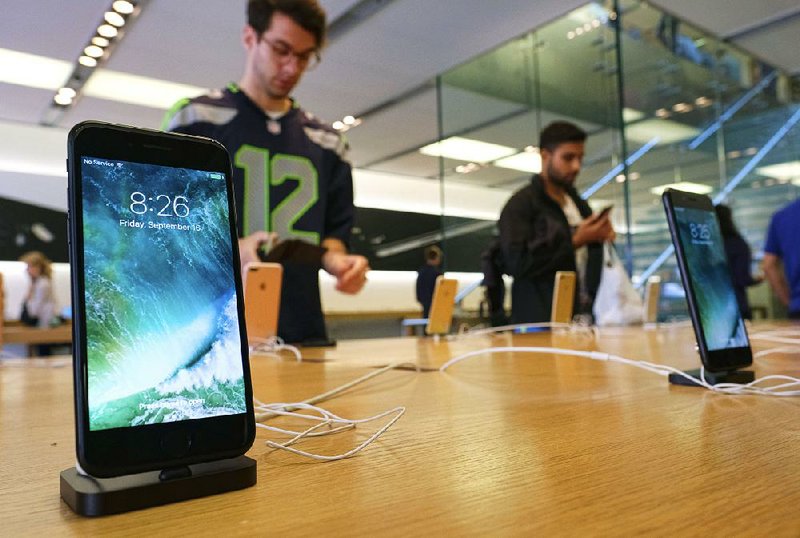Qualcomm Inc.'s battle with Apple Inc. is heating up as the chip company hauls assemblers of the iPhone into a U.S. court on claims they are failing to pay patent royalties.
Four Asian contract manufacturers, including Foxconn Technology Group and Pegatron Corp., aren't complying with obligations to pay for the use of patented technology, according to a complaint Qualcomm said it filed in federal court in San Diego. The other two companies in the lawsuit are Wistron Corp. and Compal Electronics Inc.
Unlike other smartphone companies, Apple doesn't have a direct license with Qualcomm. It instead pays contractors to make its devices, and some of the money is used to cover royalties such as those owed under agreements struck before the first iPhone was produced. The chipmaker blamed Apple for dragging its contract manufacturers into the dispute, saying the decision not to give them money for royalties had stopped them from paying Qualcomm, according to the complaint.
"Their gripe, their issue, appears to be with Apple," said Don Rosenberg, Qualcomm's general counsel. "We're suing to make the point that others shouldn't be used by Apple to advance this agenda they have of attacking us."
Qualcomm said Apple has agreed to cover the costs incurred by the contract manufacturers.
Asked for comment, Apple referred to an earnings call earlier this month in which Chief Executive Officer Tim Cook said the company is taking a "principled stand" because Qualcomm's "really great work" is only "one small part of what an iPhone is," so it doesn't merit a cut of the entire price of the handset.
Apple also repeated a statement it's given in the past. "We've been trying to reach a licensing agreement with Qualcomm for more than five years but they have refused to negotiate fair terms," Apple said in the statement. "Without an agreed-upon rate to determine how much is owed, we have suspended payments until the correct amount can be determined by the court. As we've said before, Qualcomm's demands are unreasonable and they have been charging higher rates based on our innovation, not their own."
Qualcomm's stock fell about 1 percent, or 59 cents, to $55.36 in trading Wednesday, while Apple dropped more than 5 percent, or $3.36, to close at $150.25, as broader markets fell amid political turmoil in Washington.
One of the key components of accusations against Qualcomm is the basis on which it charges for licensing. Currently the fee is calculated as a percentage of the selling price of the phone. Apple, and several other companies that work with Qualcomm, argue that should be changed to a percentage of the price of the type of semiconductor that Qualcomm makes, a switch from a base of hundreds of dollars to tens of dollars.
Apple argues that the price of the whole phone encompasses innovation that has nothing to do with Qualcomm. Qualcomm has countered that the technology it's contributed to the industry -- the way in which data are transmitted over radio waves -- is fundamental and supports all the other innovations in the phone. Charging based on the price of the phone is also an industry-standard practice established in law, the chipmaker has argued.
In addition to being one of the world's largest makers of chips for mobile devices, Qualcomm owns thousands of patents on fundamental technology that ensures all phones work. That means Qualcomm can collect money on every smartphone, even those that have chips made by other companies.
In a separate arrangement, Qualcomm pays Apple under a deal that the iPhone maker has described as a sort of "rebate" to lower the cost of royalties. Qualcomm said those payments are really part of a complex series of agreements meant to ensure peace between the two companies.
Apple earlier this year filed an antitrust lawsuit against Qualcomm, claiming that $1 billion worth of those payments are being withheld as punishment for talking to regulators who were investigating Qualcomm -- an allegation the San Diego-based chipmaker denies.
Apple has said it won't give royalty payments to contract manufacturers until the dispute is resolved, according to Qualcomm. With the contractors in turn not paying Qualcomm -- at Apple's direction, Qualcomm says -- the chipmaker last month was forced to slash third-quarter forecasts because it's unclear when the royalties will be paid.
Qualcomm, which gets the bulk of its profit from licensing revenue, has been under investigation by regulators around the world over its negotiating tactics. Apple and other companies claim Qualcomm is charging unfairly high rates in violation of pledges to license inventions that are essential for compliance with industry standards.
Samsung Electronics Co. and Intel Corp., two competing chipmakers, are backing a U.S. Federal Trade Commission antitrust suit against Qualcomm that was filed just before the Apple case.
Rosenberg said manufacturers have been put in the middle: They're paying royalties on non-Apple products as they have for a decade or more, but the royalties on Apple products aren't being paid.
"We are suing to get our money," Rosenberg said. He likened the resistance to paying for the use of Qualcomm technology to someone walking into an Apple store and refusing to pay full price for a smartphone.
"Pay for what you take, and if you don't want to pay for it, don't take it," he said.
The case was filed in San Diego because the contracts establish that as the location for any disputes to be resolved, he said.
Business on 05/18/2017
